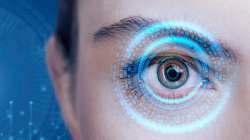Loss of vision leading cause of anxiety, depression in elderly, reveal experts
The earliest symptom of Age-related macular degeneration (AMD) is difficulty in seeing at night. At a later stage, AMD patients see blind spots and their ability to read, watch television, drive and recognise faces gets affected.

Age-related macular degeneration (AMD), which accounts for 8.7 per cent of all blindness worldwide, is the most common cause of anxiety, and depression seen among people older than 60 years, health experts said on Monday. AMD is a disease where abnormal blood vessels grow in the macula - centre part of the retina - causing damage to the central vision and making it difficult to cope. Recent projections estimate that globally the number of individuals suffering with AMD will reach 288 million in 2040. In India, the overall prevalence of AMD currently ranges from 1.4 per cent to 3.1 per cent.
The earliest symptom of AMD is difficulty in seeing at night. At a later stage, AMD patients see blind spots and their ability to read, watch television, drive and recognise faces gets affected. It later progresses to blindness. The impaired vision disturbs the routine of the patients, makes them dependent and also increases functional disability.
"People suffering from AMD, who have lost over 80 per cent of their central vision are more likely to have anxiety and depression. This is mainly as they have plans to retire smoothly, and find it difficult to read and perform recreational activities at this stage in life, which causes frustration and discomfort. Their life involves multiple visits to hospital accompanied with expensive treatments, which adds to deterioration in the quality of life," Dr. Indu Singh, Consultant Retinal surgeon and Director, Dr Daljit Singh Eye Hospital, Amritsar, said.
A recent study by the International Journal of Environmental Research and Public Health also confirmed that AMD has a negative psychological impact, and it reduces the quality of life to levels comparable to severe illnesses like cancer and stroke.
While it is important to go for walks, supervise things at home, to manage depression, Dr. Vishali Gupta, Professor, Vitreoretinal and Uvea, Advanced Eye Centre, PGIMER, Chandigarh suggested the patients to engage in activities that they can do within the comfort zone of their vision.
"These patients should use magnifiers, iPads or other low vision aid devices that can help them read the script. Today there are apps that can read books to them. The idea is to keep oneself busy and feel useful," Gupta added.
Another way to fight AMD related stress is to go for regular screening in order to avoid worsening of vision. Early diagnosis of AMD can help early treatment and also halt progression to vision loss.
Dr Daraius Shroff, a retina specialist at Shroff Eye Centre in Delhi, suggested patients with AMD share with family and friends their anxieties to help relieve mental stress as well as to gain support to find solutions to alleviate depression.